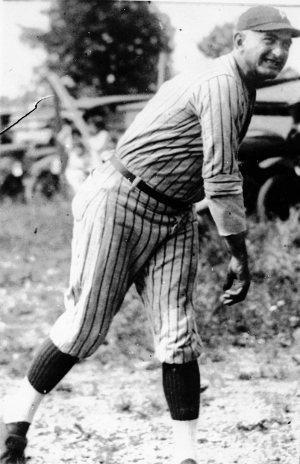MLB reinstates Pete Rose and
Shoeless Joe Jackson, making them Hall of Fame eligible
[May 14, 2025]
By RONALD BLUM
NEW YORK (AP) — Pete Rose and Shoeless Joe Jackson were reinstated
by baseball Commissioner Rob Manfred on Tuesday, making both
eligible for the sport’s Hall of Fame after their careers were
tarnished by gambling scandals.
Rose’s permanent ban was lifted eight months after his death and
came a day before the Cincinnati Reds will honor baseball’s career
hits leader with Pete Rose Night.
Manfred announced Tuesday he was changing the league's policy on
permanent ineligibility, saying bans would expire at death. MLB said
17 individuals had their status changed by the decision, including
all eight banned members of the 1919 Chicago Black Sox, former
Philadelphia Phillies president Williams D. Cox and former New York
Giants outfielder Benny Kauff.
Under the Hall of Fame’s current rules, the earliest Rose or Jackson
could be inducted would be in 2028.
Rose agreed with then-Commissioner A. Bartlett Giamatti to a
permanent ban on Aug. 23, 1989, following an investigation
commissioned by Major League Baseball concluded Rose repeatedly bet
on the Reds as a player and manager of the team from 1985-87, a
violation of a long-standing MLB rule.
Rose first applied for reinstatement in September 1997, but
Commissioner Bud Selig never ruled on the request. Manfred in 2015
rejected a petition for reinstatement, saying “Rose has not
presented credible evidence of a reconfigured life.”
Rose died Sept. 30 at age 83, and a new petition was filed Jan. 8 by
Jeffrey Lenkov, a lawyer who represented Rose. Lenkov and Rose’s
daughter Fawn had met with Manfred on Dec. 17.

Rose’s supporters have included U.S. President Donald Trump, who has
said he intends to pardon Rose posthumously. Manfred discussed Rose
with Trump when the pair met in April, but he hasn’t disclosed
specifics of their conversation.
In a letter to Lenkov, Manfred wrote, “In my view, a determination
must be made regarding how the phrase ‘permanently ineligible’
should be interpreted in light of the purposes and policies behind
Rule 21, which are to: (1) protect the game from individuals who
pose a risk to the integrity of the sport by prohibiting the
participation of such individuals; and (2) create a deterrent effect
that reduces the likelihood of future violations by others.
“In my view, once an individual has passed away, the purposes of
Rule 21 have been served.”
Marcus Giamatti, son of the former commissioner who signed the
agreement banning Rose, said in a statement he was “incredibly
disappointed” in Manfred's decision.
“I am also disappointed that my family was not consulted prior to
this decision,” he said. "The Commissioner’s decision makes this a
very dark day for baseball, the country and the fans.
"My father’s mission by banning Rose was to uphold the integrity of
the game. Therefore, reinstating Rose in this manner puts that
integrity, Rule 21 and everything that my father fought to uphold in
peril."
A 17-time All-Star during a playing career from 1963-86, Rose holds
record for hits (4,256), games (3,562), at-bats (14,053), plate
appearances (15,890) and singles (3,215). He was the 1963 NL Rookie
of the Year, 1973 MVP and 1975 World Series MVP. A three-time NL
batting champion, he broke the prior hits record of 4,191 set by Ty
Cobb from 1905-28.
Jackson was a .356 career hitter who was among the eight Black Sox
banned for throwing the 1919 World Series. He died in 1951, but he
remains one of baseball's most recognizable names in part for his
depiction by Ray Liotta in the 1989 movie Field of Dreams.
[to top of second column] |

This undated file photo shows baseball player player Shoeless Joe
Jackson. (AP Photo/File)

What else needs to happen for Rose or Jackson to
reach the Hall of Fame?
Under a rule adopted by the Hall’s board of directors in 1991,
anyone on the permanently ineligible list can’t be considered for
election to the Hall. Jackson was twice considered on ballots by the
Baseball Writers' Association of America, but received just 0.9% in
1936 and 1% of a nominating vote in 1940.
Rose’s reinstatement occurred too late for him to be considered for
the BBWAA ballot. If not on the permanently banned list, Rose would
have been eligible on the ballots each from 1992 through 2006. He
was written in on 41 votes in 1992 and on 243 of 7,232 ballots
(3.4%) over the 15 years, votes that were not counted.
Without the ban, both players are eligible for the Hall’s Classic
Baseball Era, which next meets to consider players in December 2027
and considers those whose greatest contributions to the sport were
before 1980.
A 10-person historical overview committee selects eight ballot
candidates with the approval of the Hall’s board, and the ballot is
considered by 16 members at the winter meetings, with a 75% or
higher vote needed. The committee members include Hall of Fame
members, team executives and media/historians.
Hall of Fame Chairman of the Board Jane Forbes Clark confirmed in a
statement that players affected by Manfred’s ruling Tuesday would be
considered.
“The National Baseball Hall of Fame has always maintained that
anyone removed from Baseball’s permanently ineligible list will
become eligible for Hall of Fame consideration,” she said. “Major
League Baseball’s decision to remove deceased individuals from the
permanently ineligible list will allow for the Hall of Fame
candidacy of such individuals to now be considered.”
Among the players in the 2028 class eligible for the BBWAA ballot
are Albert Pujols and Yadier Molina.

Did Trump help get Rose reinstated?
Trump has said he would pardon Rose, but it’s not clear what a
presidential pardon for Rose would entail.
Rose entered guilty pleas on April 20, 1990, to two counts of filing
false tax returns, admitting he failed to report $354,968 during a
four-year period. Rose was sentenced on July 19, 1990, by U.S.
District Judge S. Arthur Spiegel in Cincinnati to five months in
prison. He also was fined $50,000 and ordered to perform 1,000 hours
of community service as a gym teacher’s assistant with inner-city
youths in Cincinnati as part of a one-year probation period. The
first three months of the probation were to be spent at the halfway
house. Rose repaid the Internal Revenue Service $366,042.
All contents © copyright 2025 Associated Press. All rights reserved |